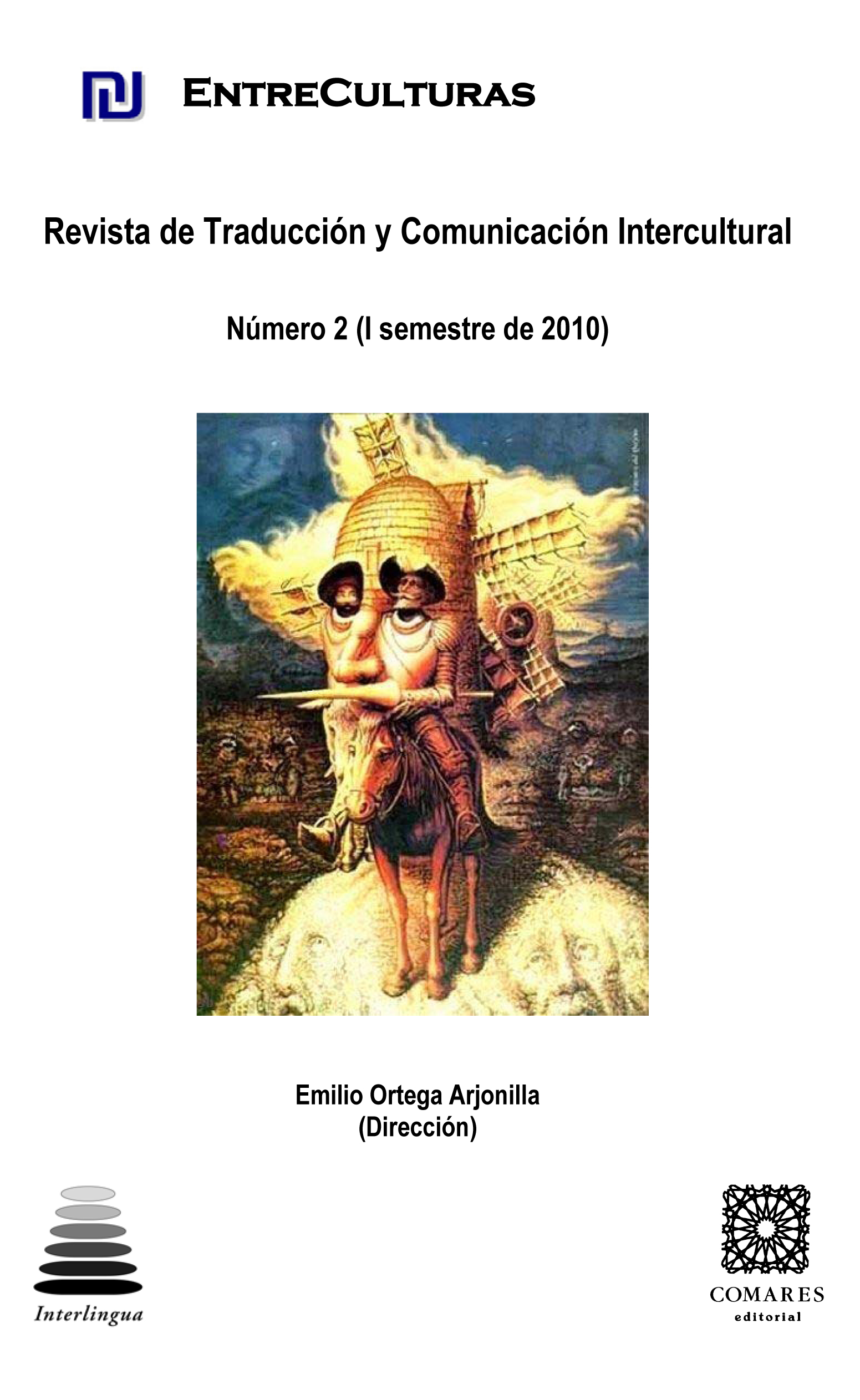EL BUSHIDO DE NITOBE Y LA MORAL OCCIDENTAL
DOI:
https://doi.org/10.24310/Entreculturasertci.vi2.11756Keywords:
Translation, Identity, Linguistic imbalancesAbstract
In this article, some of the main points of the book Bushido – The Soul of Japan by Nitobe Inazó are described. It was first published in English in the twentieth century and it has been one of the most important sources of diffusion of the values of the international audience in Japan, that is, of the European countries and, particularly, of the United States, a country where the author saw the need to approach Japan development. In this article, Bushido’s sources will be searched to explain the formation of the ethics and moral of Japan citizens, at the beginning of the twentieth century, in contrast to Western countries.
Downloads
Metrics
References
ASTON, W. G. (1988): Nihongi – Chronicles of Japan from the Earliest Times to A.D. 697. Tokio, Charles E. Tuttle Co., Inc., 1988.
BENEDICT, R. (2007): O Crisântemo e a Espada. São Paulo, Perspectiva.
CAMPBELL, J. (1962): The Masks of God: Oriental Mythology. Viking Press.
GONÇALVES, R. M. (1975): Considerações sobre o Culto de Amida no Japão Medieval – Um exemplo de consciência histórica no Budismo Japonês. São Paulo, USP.
HOLTOM, D. C. (2004): Un estudio sobre el Shintô moderno – La fe nacional del Japón. Barcelona: Paidós Orientalia.
JASPERS, K. (1985): Socrater, Buddha, Confucius, Jesus – The paradigmatic Individuals.
KITASAWA, S. (1953): The life of Dr. Nitobe. Tokio, Hokuseido Press.
MOORE, C. A. (1978): Filosofia: oriente e ocidente. São Paulo, Editora Cultrix/ Editora da Universidade de São Paulo.
NAVARRO, M. T. (2007): Análisis de la obra Bushido, The soul of Japan de Inazo Nitobe, desde la triple perspectiva traductológica, cultural y jurídica. Tesis doctoral. Granada, Universidad de Granada.
NIETZSCHE, F. W. (1992): Além do Bem e do Mal: Prelúdio a uma Filosofia do Futuro. São Paulo, Companhia das Letras.
? (2004): Aurora: Reflexões sobre os preceitos morais. São Paulo, Companhia das Letras.
? (2007): O Anticristo: Maldição ao Cristianismo. São Paulo, Companhia das Letras.
NITOBE, I. (1908): Bushido: The Soul of Japan. Tokio.
? (1912): The Japanese Nation: Its Land, Its People and Its Life. Nueva York, The Knickerbocker Press.
? (1931): Western Influences in Modern Japan. Chicago, University of Chicago Press.
? (1939): Lectures on Japan: An Outline of the Development of the Japanese People and Their Culture. Tokio, Kenkyusha.
? (2005): Bushido: A alma de Samurai. Traducción: Emílio Carlos de Albuquerque. São Paulo, Editora Tahyu.
? (2009): The Intercourse Between the United States and Japan: A Historical Sketch. Charleston, Bibliolife.
PHILIPPI, D. L. (trad.) (1989): Kojiki. Tokio, University of Tokyo Press.
SCHERER, J. A. B. (1906): What is Japanese Morality? Philadelphia, The Sunday School Times Co.
SHARUN, S. (2001): Show Me A Samurai: British Representations of Japanese Manhood, 1895-1905. Tesis de master. University of Saskatchewan.
TOMITA, T. (2007): Sanshiro Sugata. Tradução: Shintaro Hayashi. São Paulo, Topan-Press.
TURNBULL, S. (2006): Samurai: O Lendário Mundo dos Guerreiros. Traducción: Roger Maioli dos Santos. São Paulo, M. Books.
VV.AA. (1944): Philosophy – East and West. Princeton University Press.
VERNANT, J-P. (1962): Les origines de la pensée grecque. París.
ARTÍCULOS
HIYOTA, M. (2002): “Critique du livre d’Inazô Nitobe Bushido: the Soul of Japan” en The Shambala Guide to Kendo, 99-104.
HOWES, J. F. (1993): “Japan’s New Internationalism and the Legacy of Nitobe Inazo: Sixty Years Later”. Occasional Paper#5, Leitura apresentada na Annual Dorothy and David Lam Lecture Series, 21 Out.
KOJIMA, A. (2003): “Nitobe Inazô: A man for today’s Japan”. Japan Echo, vol. 30, nº. 6, dec.
MORIMOTO, S. (2003): “Confrontation, Embarrassment and Reflection: Japan Meets the West”. ABAC Journal, vol. 23, n.º 3, set.-dec., 59-64.
NAGAO, T. (2002): “The Influence of Burke and Carlyle on the Work of Inazo Nitobe”. The Annual Report on Cultural Science, n.º 106, 49-69.
NAVARRO, M. T. (2008): “El discurso orientalista en la traducción francesa (1927) del Bushido de Nitobe”. Inter Asia Papers, n.º 5, 1-26.
? y SERRANO MUÑOZ, R. (2008): “La influencia del Bushidô en La Constitución Japonesa de 1889 y en El Edicto Imperial de La Educación de 1890” en Nuevas perspectivas de investigación sobre Asia Pacifico. Granada, Editorial Universidad de Granada, nº. 2, 239-253.
? y BEEBY, A. (2009): Millán-Astray’s Translation of Nitobe’s Bushido: The Soul of Japan. Translator’s Journal, vol. 54, n.º 2, 218-232.
TANAKA, S. (1980): “Nitobe Inazo and Korea”. Hokudai Economic Papers, University Collection Of Scholarly and Academic Papers, nº. 10, 50-67.
TAKAHASHI, Y. (1995): Dr. Inazo Nitobe and co-operatives. International Cooperative Information Centre – ICA Review. California, ICA, vol. 88, n. 1, 1995.
Downloads
Published
How to Cite
Issue
Section
License
All contents published in Entre culturas. Revista de traducción y comunicación intercultural are protected under the Creative Commons Attribution-NonCommercial-ShareAlike 4.0 International (CC BY-NC-SA 4.0) license. All about this license is available in the following link: <http://creativecommons.org/licenses/by-nc-sa/4.0>
Users can copy, use, redistribute, share and exhibit publicly as long as:
- The original source and authorship of the material are cited (Journal, Publisher and URL of the work).
- It is not used for comercial purposes.
- The existence of the license and its especifications are mentioned.
There are two sets of authors’ rights: moral and property rights. Moral rights are perpetual prerogatives, unrenounceable, not-transferable, unalienable, imprescriptible and inembargable. According to authors’ rights legislation, Entreculturas. Revista de traducción y comunicación intercultural recognizes and respects authors moral rights, as well as the ownership of property rights, which will be transferred to University of Malaga in open access. The property rights are referred to the benefits that are gained by the use or the dissemination of works. Entreculturas. Revista de traducción y comunicación intercultural is published in an open access form and it is exclusively licenced by any means for doing or authorising distribution, dissemination, reproduction, , adaptation, translation or arrangement of works.
Authors are responsable for obtaining the necessary permission to use copyrighted images.





7.png)
